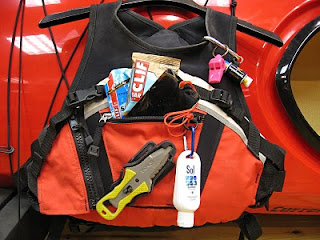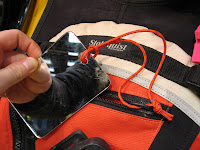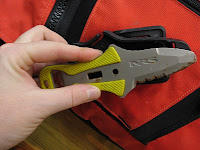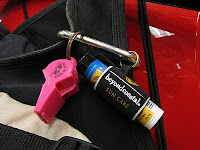What the Law Requires
All kayakers are required to have a PFD by law. There are a few other items the Coast Guard requires us to carry to be legal. These include:
a sound producing device
a signaling device
a visual distress signal
a navigational light
Meeting Those Requirements
All kayakers are required to have a PFD by law. There are a few other items the Coast Guard requires us to carry to be legal. These include:
Meeting Those Requirements
The law doesn't provide definitions for these items and doesn't direct the paddler on where they should be stored. There is definitely room for creativity. Here are a few options to fulfill those Coast Guard requirements:
So where should you store all that stuff? In a dry bag in a hatch? In a deck bag? On your PFD? Here is where I keep it all... I have all of these things, either in my kayak or on my body. Here is what I carry:
| In my PFD |
On the Deck |
In my Pelican Box |
In emergency situations, having these easily accessible can mean the difference between life and death. They should never be stored in a hatch, where they are very hard to get to. In a worst-case scenario, the paddler is a swimmer without a kayak. In this scenario, it is important that the paddler (now swimmer) has the essential equipment to survive. I don't keep my VHF radio on my PFD because I know that the conditions I paddle in are unlikely to separate me from my boat. If you are paddling alone or in rough water, you absolutely should have your VHF attached to you.
You should equip your PFD with essentials based on where, when and what you will be paddling. Keeping a marine radio on your life jacket while paddling a quiet cypress swamp is overkill. Keeping it on your PFD while paddling in open ocean is definitely not. When in doubt, over-prepare. Many guides in colder environments keep emergency blankets in their PFDs. Some guides even tether a dry bag with fire making materials and extra clothes to themselves!
 Attaching things to your PFD
Attaching things to your PFDThis is where things get tricky. It can be hard to get all of this stuff to fit, especially if your PFD has only a pocket or two, like mine. There are ways around this. One of them is the carabiner trick seen below. Don't be afraid to add knife attachment points or clips to your PFD, just make sure you mess with the flotation and make sure your modifications won't get you tangled or caught on anything. It is also very important not to overload your jacket with too much stuff. Your PFD is meant to keep you afloat. Do not sacrifice crucial buoyancy for unnecessary equipment.
A carabiner on the shoulder strap can be a great way to hang your whistle and lip balm. I know many male guides who do this. This trick works great for people with broad chests, but I found that the carabiner rubbed against my arm when I paddled. I replaced the carabiner with a loop of 1/4" bungee cord.

I keep my mirror on a lanyard. If it's so bad that I'm using a mirror, it's bad enough for me to loose it if it isn't tied to me.
I often keep a cliff bar or cliff shot in there too, for fast fuel. I have to take any snacks out every night so mice don't chew into my PFD. Raccoons will steal life jackets out of kayaks if we leave granola bars in them.
 My knife is the NRS Co-Pilot Rescue Knife. I use it to cut birds and turtles free from nets, cut anyone who gets tangled in anything free, and to spread Nutella on my bagel at breakfast. Having a rescue knife with a blunt tip is crucial. Never attempt to free anyone with a pointed blade. It often ends in tragedy. Consider using bungee to connect your knife to your PFD to avoid dropping it during rescues.
My knife is the NRS Co-Pilot Rescue Knife. I use it to cut birds and turtles free from nets, cut anyone who gets tangled in anything free, and to spread Nutella on my bagel at breakfast. Having a rescue knife with a blunt tip is crucial. Never attempt to free anyone with a pointed blade. It often ends in tragedy. Consider using bungee to connect your knife to your PFD to avoid dropping it during rescues.Trick it out for Comfort and Safety
Be Seen
If your PFD doesn't have any reflective strips on it, adding reflective strips to the shoulders is a must for better visibility. Reflective strips for PFDs are available from:
- North Water
- Black Sew-on Reflective Tape- from Amazon
- Kokatat - Velcro backed

Stay Hydrated
With a hydration bladder, you won't have to sacrifice your pace and rhythm to stay hydrated. The NRS PFD Hydration Pack straps to most PFDs and can be worn as a backpack when off the water. Kokatat also makes the Tributary Hydration Bladder but it will not fit many of the PFDs on the market.
Storage Solutions
If you just can't fit everything onto your favorite PFD, there are several solutions. Kokatat has a variety of options that strap to Kokatak brand PFDs, that may also work with other brands.
The Tactic Pack straps to the back of a PFD, has room for a hydration bladder and a VHF radio, and cleverly unclips to allow the wearer to access those items while paddling.
The Belly Pocket attaches to many PFDs with front adjustment straps and keeps important items handy.
Did you find this post helpful? Do you enjoy reading this blog? Help me keep it going by buying me a 'coffee'




